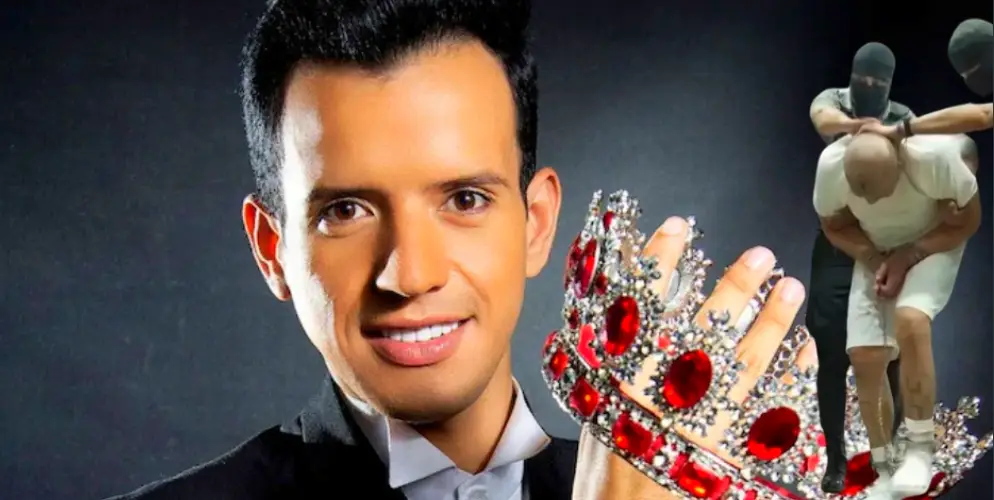How Donald Trump Turned a Venezuelan Makeup Artist into Public Enemy No. 1.
In the logic of the new America, a tattoo is enough to be deported. Not a crime, not a conviction, not a confession, just ink on skin, an image, a symbol, misunderstood or deliberately distorted. This is the kind of story that seems to come from the depths of an authoritarian regime. And yet, it is unfolding in the United States, under President Donald Trump, and it begins with a crown on the wrist of a Venezuelan makeup artist.
Andry José Hernández Romero, 31 years old, slight in stature, loves theatre, costumes, and his hometown of Capacho, a sleepy village in the Venezuelan Andes that erupts in ornate celebration each year for Three Kings Day. Andry, an actor, designer, and makeup artist, is at the heart of this tradition. The crown on his arm? A symbol of Epiphany, of wisdom, hope, and magic. Now it is cited as evidence of gang affiliation.
The Wrong Story at the Wrong Time
In August 2024, Andry set out for the United States. No criminal record, no weapons, no agenda—only fear of persecution in Venezuela and the hope for a better life. In his asylum interview, he credibly recounted being targeted by regime-aligned vigilantes, assaulted by a boss, and followed home at night. U.S. officials acknowledged a “credible fear” of persecution. But during a routine medical exam, agents focused on his tattoos—two small crowns inked with the words “Mom” and “Dad.” According to ICE’s “Alien Enemy Validation Guide,” these alone count for four points. Six points means you may be a gang member. Andry’s crowns, they claimed, were identifiers for Tren de Aragua, a notorious Venezuelan gang.
But that’s not true. Criminologists, journalists, even tattoo artists disagree. The gang has no fixed symbols. The “evidence” is a projection, rooted in stereotypes about MS-13, a completely different Central American group. What remains is a government policy that equates cultural identity with criminality. Andry was detained, without charge, without trial. And then deported.
A President, a Law, a Flight to Nowhere
On March 14th, 2025, President Trump activated the Alien Enemies Act, a law from 1798, originally intended for wartime internment of foreign nationals. Once used against the British, the Germans, and the Japanese, it has now been turned against Venezuelans. The rationale? Venezuela is an “enemy actor,” Tren de Aragua an arm of the Maduro regime. The judiciary found out too late. While Judge James Boasberg in Washington tried to issue a restraining order, planes were already in the air, bound for El Salvador, carrying hundreds of detainees—including Andry.
In El Salvador, they would find no asylum hearings, no legal protections. President Nayib Bukele, who has suspended parts of his own constitution, had built a mega-prison and offered the United States a deal: outsource your “criminal aliens” to us. A bargain in cruelty.
The Color of Hair as Suspicion
Andry vanished. His attorney learned of his transfer only when he failed to appear in court. “He’s been sent to El Salvador,” the government explained, casually, no order of removal, no warning, no accountability. Days later, video emerged: Venezuelan men, heads shaved, dressed in white prison uniforms, kneeling in the corridors of Bukele’s “Terrorism Confinement Center.” Among them were musicians, gardeners, students. And one makeup artist.
A voice speaks to the camera: “I am not a gang member. I’m gay. I’m a barber.”
Was it Andry? No one knows for sure. But the story fits too well. His family recognized him in photos. His friends began sharing footage from Capacho’s theatre festival. The entire town mobilized. A theatre director penned pleas to Bukele. Children drew signs. Many wore paper crowns.
The America That Remains
Meanwhile, Trump defended the operation. Homeland Security Secretary Kristi Noem posed in El Salvador in front of prisoners tattooed with MS-13 symbols. “We will use every tool,” she said, “against America’s enemies.” That there was no evidence seemed not to matter. That Judge Boasberg had intervened was mocked as “micromanagement.”
When federal judge Patricia Millett reviewed the case, she remarked, “The Nazis received better treatment under the Alien Enemies Act.”
What does justice mean in a country where a president can declare someone an “enemy” with a gesture? What is truth when a tattoo from a festival becomes a weapon? What is the rule of law when planes take off while judges are still speaking?
Andry is gone. His name remains in court filings. His images fill the streets of Capacho. On his wrists: two crowns. In a country that no longer remembers what a crown once meant, hope, dignity, the nobility of the spirit.
What remains is the question Orwell once asked: When does tyranny begin? Perhaps when beauty is mistaken for threat. Perhaps when we stop distinguishing between an artist and a criminal. Perhaps when we look away as someone disappears, just because of the ink on their skin.
Investigative journalism requires courage – and your support.
Support our work against right-wing populism, disinformation, and violations of human and environmental rights. Every contribution goes directly into our daily reporting – we operate without advertising, without subscriptions, without corporations, without political parties. Our journalism is meant to remain freely accessible. For everyone.
Independent – Critical – For Everyone
Thank you for making our independent work possible.
